Alcohol poisoning is a severe medical condition resulting from consuming a large amount of alcohol in a short period. The Centers for Disease Control and Prevention (CDC) reports approximately 2,200 deaths from alcohol poisoning annually in the United States. This number shows the dangers of excessive alcohol intake.
Symptoms of alcohol poisoning include confusion, vomiting, seizures, slow or irregular breathing, hypothermia, and unconsciousness. Early recognition and medical intervention are imperative to prevent serious health consequences or death.
The primary cause of alcohol poisoning is binge drinking. The liver metabolizes about one standard drink per hour; consuming more than this can elevate blood alcohol concentration (BAC) to dangerous levels. Factors such as body weight, sex, and overall health also influence susceptibility to alcohol poisoning.
Complications from alcohol poisoning can be severe and include brain damage, seizures from hypoglycemia, dehydration leading to permanent brain injury, and hypothermia that can result in cardiac arrest. Understanding the risks associated with excessive alcohol consumption is important for prevention.
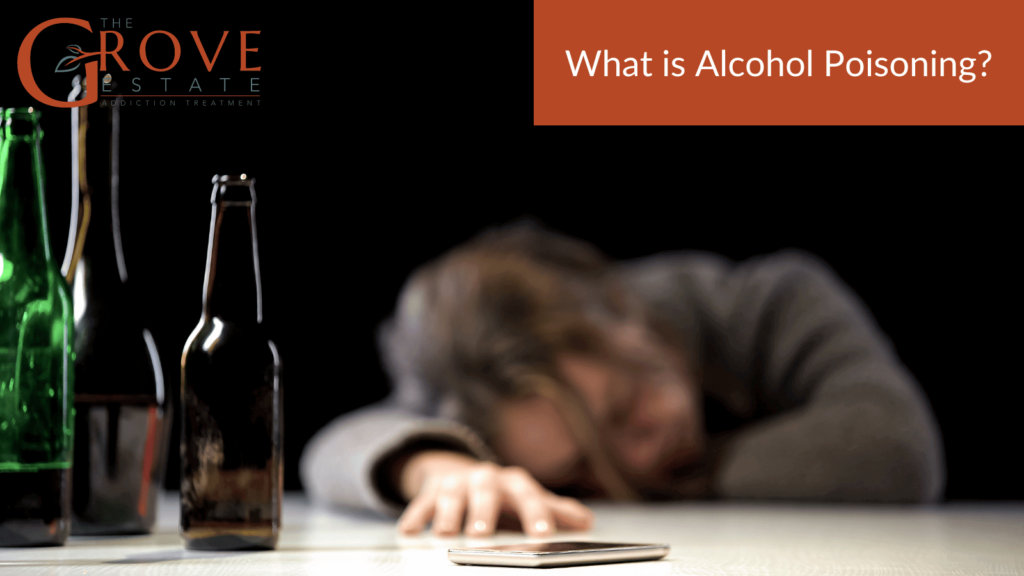
What Is Alcohol Poisoning?
Alcohol poisoning is a serious and potentially life-threatening condition that occurs when a person drinks a toxic amount of alcohol, usually over a short period of time. This level of alcohol in the bloodstream interferes with the body’s basic life-support functions, such as breathing, heart rate, and temperature regulation.
Unlike simply being drunk, alcohol poisoning is a medical emergency that requires immediate attention. While being drunk involves a spectrum of impairment levels, from mild euphoria and loosened inhibitions to more severe effects such as blurred vision and coordination problems, alcohol poisoning surpasses this. It leads to stupor, unconsciousness, and potentially fatal respiratory depression. The difference lies in the blood alcohol concentration (BAC) level: being drunk affects judgment and motor skills, but alcohol poisoning affects the body’s involuntary reflexes and halts essential physiological functions.
What are the Symptoms of Alcohol Poisoning?
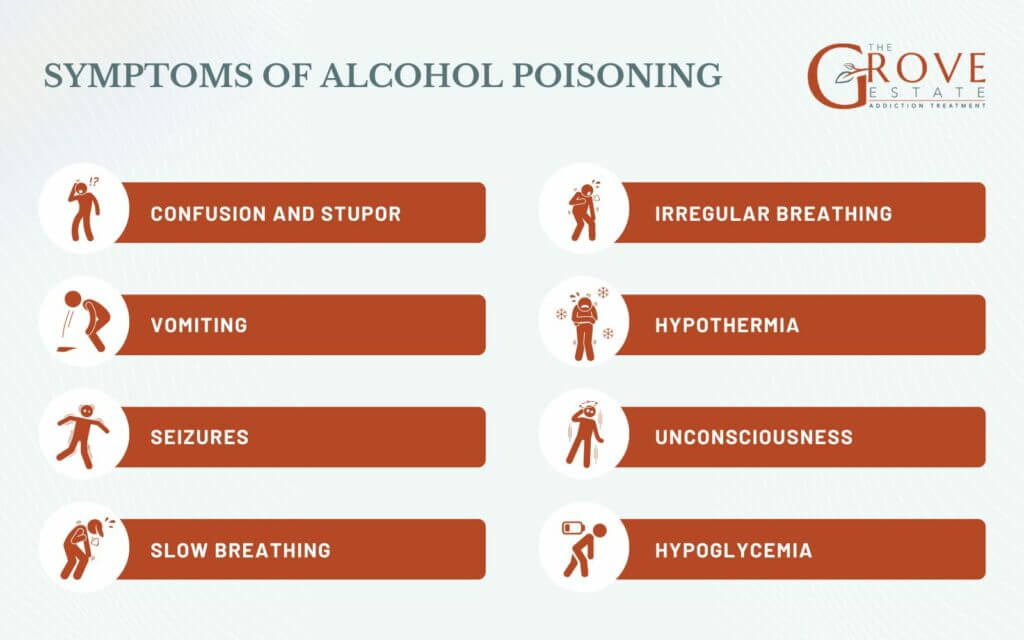
Alcohol poisoning manifests through a variety of severe symptoms that signal the body’s inability to cope with the amount of alcohol consumed. Recognizing these symptoms is critical as they require urgent medical intervention to prevent fatal outcomes. Here’s a detailed list of common symptoms associated with alcohol poisoning:
- Confusion and Stupor: Often the individual is extremely confused, disoriented, or may slip into a stupor.
- Vomiting: Frequent vomiting will occur, which increases the risk of choking, especially if the gag reflex is impaired.
- Seizures: As the body reacts to the excessive alcohol, seizures may occur.
- Slow breathing: Fewer than eight breaths per minute is a particularly dangerous symptom.
- Irregular breathing: Gaps of more than 10 seconds between breaths are a critical warning sign.
- Hypothermia: A noticeably low body temperature or a bluish skin coloration due to cold or paleness can be signs of serious risk.
- Unconsciousness: Inability to wake up or unresponsiveness to stimuli is a severe indication of alcohol poisoning.
- Hypoglycemia: Low blood sugar, which will lead to seizures.
These symptoms indicate that the body is overwhelmed by alcohol and cannot safely metabolize it, which can quickly lead to perilous health issues or even death. The urgency of identifying these signs cannot be overstated, if someone exhibits one or more of these symptoms, seek emergency medical help immediately.
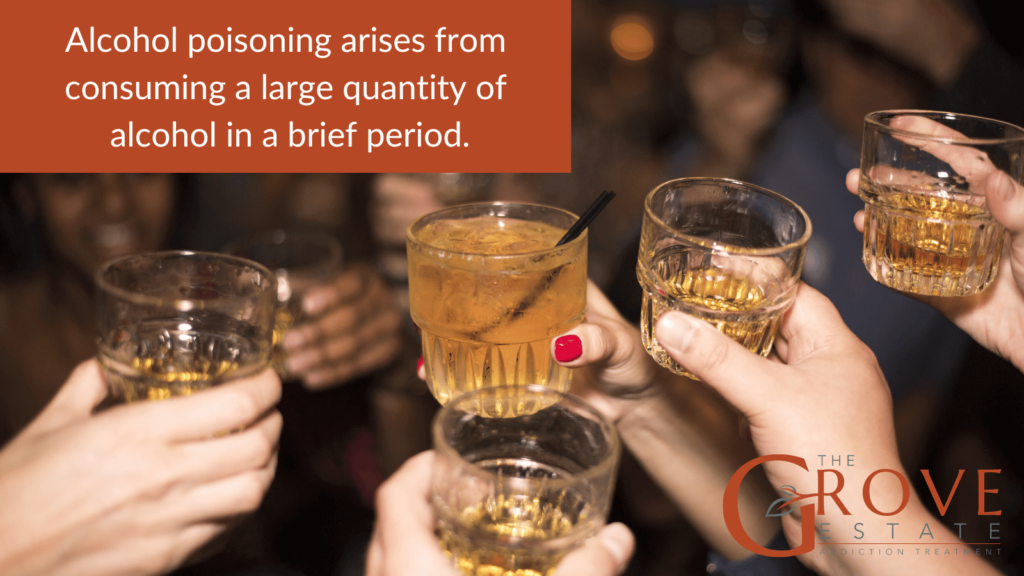
What Causes Alcohol Poisoning?
Alcohol poisoning arises from consuming a large quantity of alcohol in a brief period. Alcohol is absorbed into the bloodstream via the stomach and intestines, affecting all organs, including the brain. Binge drinking leads to a higher blood alcohol concentration (BAC), which impairs brain functions and disrupts vital life-support functions such as breathing and heart rate.
Defined as consuming four or more drinks for adult women, or five or more for adult men within about two hours, binge drinking overwhelms the liver’s capacity to metabolize alcohol, resulting in a rapid increase in BAC. The term “drink” refers to a standard amount of alcohol, such as one 12-ounce beer, one 5-ounce glass of wine, or 1.5 ounces of distilled spirits, each containing roughly the same amount of alcohol. This high level of intoxication can severely impair or even shut down essential bodily functions. Factors like weight, sex, medication use, and health status also influence alcohol toxicity risk.
Who is at Risk of Alcohol Poisoning?
Certain factors and populations are more vulnerable to alcohol poisoning. Risk is particularly high among individuals engaging in binge drinking and those with low alcohol tolerance.
Risk Factors and Vulnerable Populations:
- Young adults: Especially college students, who might engage in binge drinking during social activities.
- People with high alcohol tolerance: Those who can consume more before feeling the effects are often at risk because they may consume dangerous amounts before recognizing the symptoms of poisoning.
- Individuals with certain medical conditions: Such as liver disease, which can impair the body’s ability to process alcohol.
Alcohol tolerance can paradoxically increase risk. Individuals with higher tolerance may not feel the effects of alcohol immediately, which can lead to consuming larger amounts. However, the body’s ability to metabolize alcohol does not increase with tolerance, leading to a higher risk of poisoning as more alcohol is consumed before the effects are felt.
What are the Complications that Arise from Alcohol Poisoning?
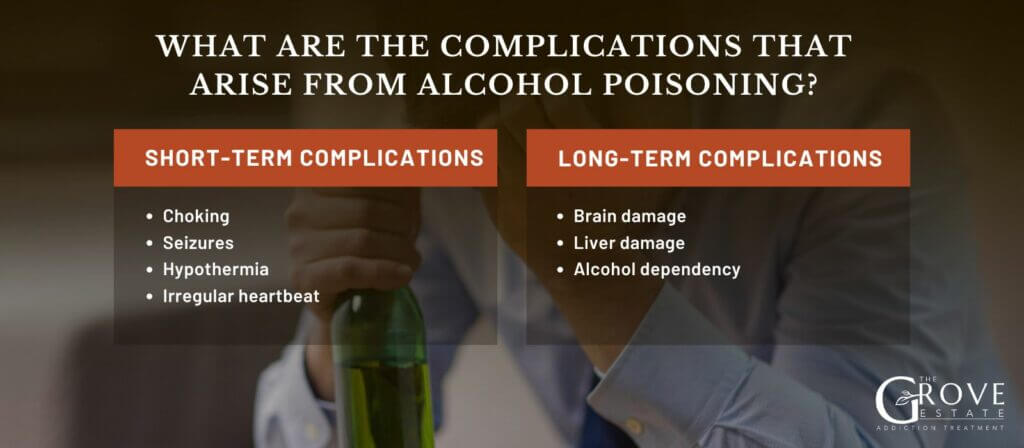
Alcohol poisoning can lead to severe short and long-term health complications, relaying the critical need for immediate medical treatment to prevent lasting damage.
Short-Term Complications:
- Choking: Alcohol-induced vomiting can lead to choking, especially if the gag reflex is compromised.
- Seizures: Due to low blood sugar levels or withdrawal effects.
- Hypothermia: Alcohol dilates blood vessels, leading to rapid body heat loss and potentially dangerous drops in body temperature.
- Irregular heartbeat: Alcohol can disrupt the heart’s rhythm, posing a risk for cardiac complications.
Long-Term Complications:
- Brain damage: Prolonged exposure to high levels of alcohol can lead to permanent brain damage affecting memory, coordination, and cognitive functions.
- Liver damage: Chronic excessive drinking leads to irreversible liver damage and diseases like cirrhosis.
- Alcohol dependency: Repeated episodes of alcohol poisoning contributes to the development of alcohol dependence or alcoholism.
Immediate medical intervention is essential to manage and mitigate these complications. Medical professionals can provide life-saving care, such as managing breathing, circulation, and body temperature, as well as preventing more severe outcomes like brain injury or death. Prompt treatment not only addresses immediate health threats but also reduces the risk of developing chronic health issues associated with alcohol poisoning.
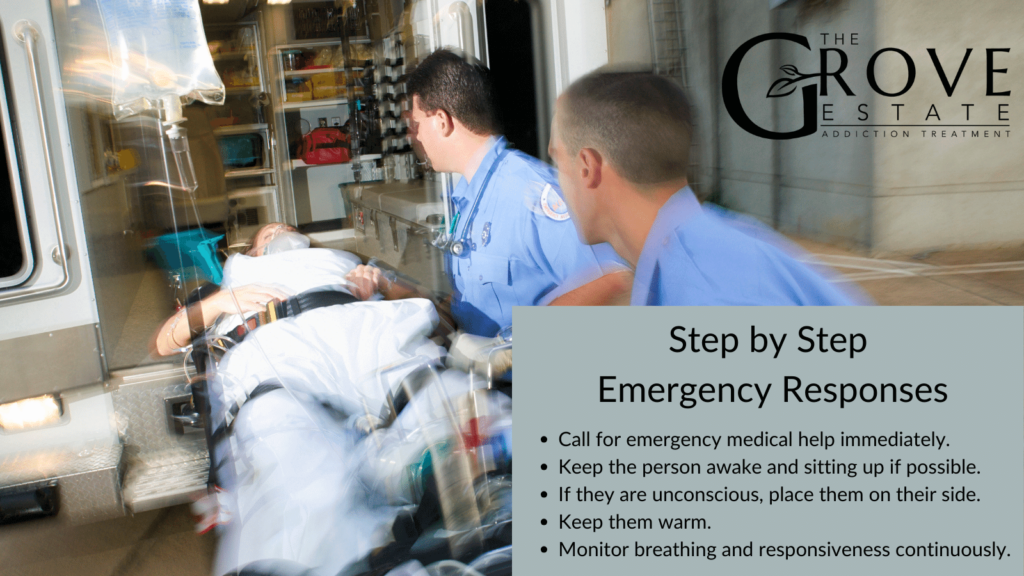
What Should I Do If Someone Shows Signs of Alcohol Poisoning?
When you suspect someone has alcohol poisoning, quick and informed actions can be life-saving. Here’s a step-by-step guide on what to do:
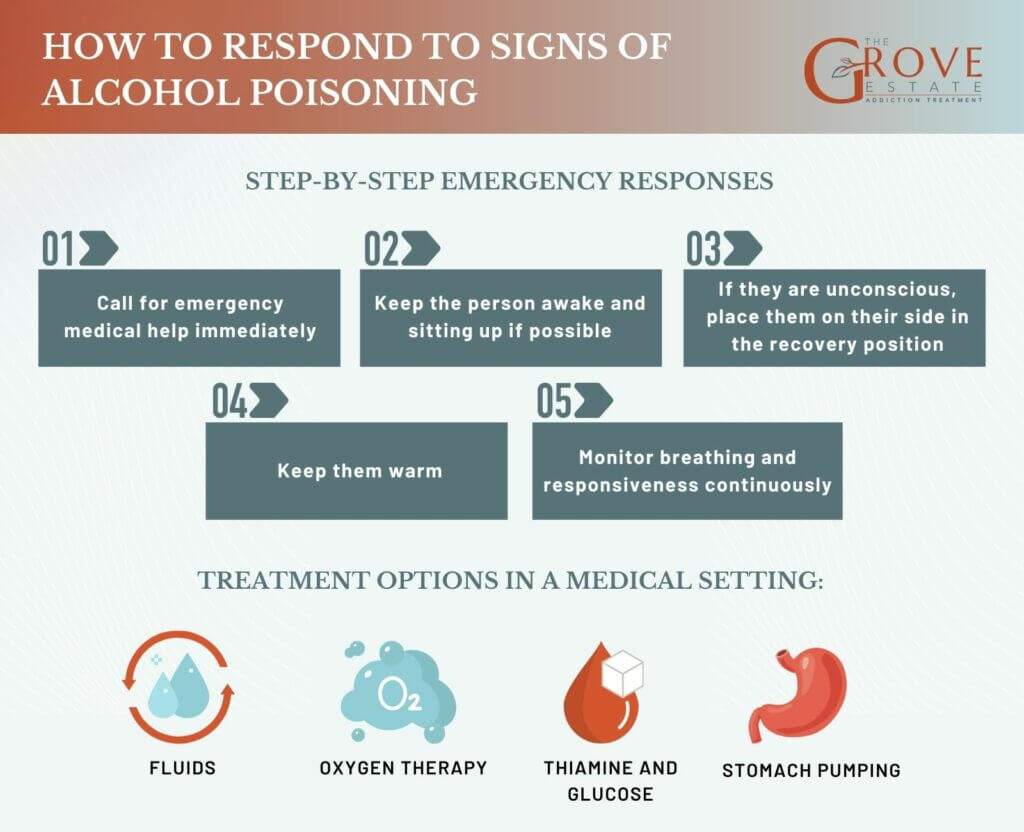
Step-by-Step Emergency Responses:
- Call for emergency medical help immediately: Do not wait for all symptoms to appear, early intervention is crucial.
- Keep the person awake and sitting up if possible: This helps prevent choking and keeps the airway open.
- If they are unconscious, place them on their side in the recovery position: This prevents choking on vomit and helps maintain an open airway.
- Keep them warm: As alcohol causes body temperature to drop, it’s important to cover them with warm blankets.
- Monitor breathing and responsiveness continuously: If there is any decline in their condition, update the emergency services when they arrive.
Treatment Options in a Medical Setting:
- Fluids: Intravenous fluids may be given to prevent dehydration and help flush out alcohol.
- Oxygen therapy: To assist with breathing if there are difficulties.
- Thiamine and glucose: Often administered to prevent or treat low blood sugar and certain types of brain damage.
- Stomach pumping: In extreme cases, to quickly remove unabsorbed alcohol from the stomach.
How to Prevent Alcohol Poisoning?
To prevent alcohol poisoning, individuals and communities should adopt several strategies and promote awareness. Educating people about the dangers of excessive drinking and the signs of alcohol poisoning is crucial. Strategies include moderating alcohol intake, understanding one’s limits, and never drinking on an empty stomach, which slows the absorption of alcohol. Community-level efforts play an important role. Encouraging the use of designated drivers or alternative transportation methods will also reduce the risks associated with heavy drinking. Overall, awareness and education are key to preventing alcohol poisoning and promoting safer drinking habits.

How Do You Recover and Find Support After Alcohol Poisoning?
Recovering from alcohol poisoning involves both physical recovery and addressing any underlying issues with alcohol use. Physically, individuals may need time to allow their bodies to rest and rebalance essential functions disrupted by alcohol. It’s also crucial to evaluate personal drinking habits and consider seeking treatment if alcohol consumption is recurrently harmful.
Support is found through local health services, alcohol support groups like Alcoholics Anonymous, or counseling that specializes in substance misuse. These resources provide not only immediate recovery support but also long-term strategies to prevent future incidents, focusing on healthier lifestyle choices and coping mechanisms.
What legal implications can arise from alcohol poisoning incidents?
Individuals providing alcohol to minors or hosting parties where excessive drinking occurs may face criminal charges, fines, or civil liabilities. Businesses like bars could also be held responsible for serving intoxicated patrons, potentially leading to legal consequences.
Can you die from alcohol poisoning?
Yes, alcohol poisoning can be fatal. Death can result from choking, dehydration, hypothermia, irregular heartbeat, or respiratory failure, making it crucial to treat as a medical emergency.
How does alcohol poisoning affect mental health?
Alcohol poisoning can cause severe anxiety, confusion, and long-term issues like depression and memory loss. Persistent mental health problems and emotional disturbances may follow repeated episodes.
What treatment is used to recover from alcohol poisoning?
It typically includes supportive care such as monitoring vital signs, administering oxygen, and providing intravenous fluids to prevent dehydration. If necessary, doctors may use medications to manage seizures or low blood sugar levels. In severe cases, stomach pumping or activated charcoal may be employed to remove unabsorbed alcohol.
What is the difference between alcohol poisoning and blacking out?
Alcohol poisoning is a severe and potentially life-threatening condition caused by drinking excessive amounts of alcohol in a short period. It affects the body’s vital functions, leading to symptoms like confusion, vomiting, seizures, slow breathing, hypothermia, and unconsciousness. These symptoms indicate a critical level of intoxication that requires immediate medical intervention to prevent serious health consequences or death.
Blacking out, often referred to as alcohol-induced amnesia, occurs when alcohol affects the brain’s ability to form new memories. During a blackout, a person can still actively engage and appear conscious but will not remember events later. The condition is a serious indication of high blood alcohol concentration, which can dangerously progress to alcohol poisoning if alcohol consumption continues. More details on managing and understanding blackouts can be found at blacking out.
How does binge drinking lead to alcohol poisoning?
Binge drinking is the primary cause of alcohol poisoning and involves consuming a large amount of alcohol in a short period, typically defined as five or more drinks for men, and four or more drinks for women within about two hours. This pattern of drinking brings blood alcohol concentration (BAC) to levels that are toxic to the body and impairs functions such as breathing, heart rate, and temperature regulation.
The rapid increase in BAC overwhelms the liver’s ability to metabolize alcohol, leading to accumulation and toxic effects in the body, including potential damage to organs and systems. Binge drinking is a dangerous practice and understanding its risks is crucial. Educational resources like drug & alcohol seminars can provide valuable information on the effects of excessive alcohol use and strategies to reduce alcohol-related harms.

Share This Post



